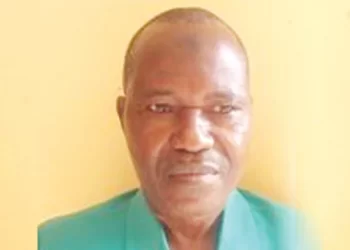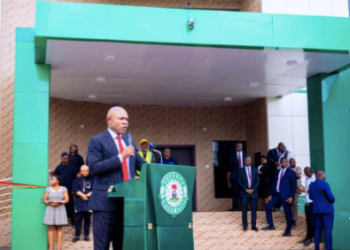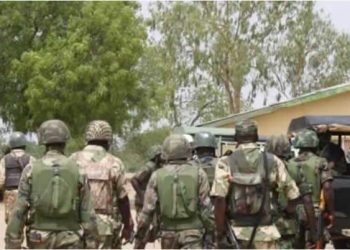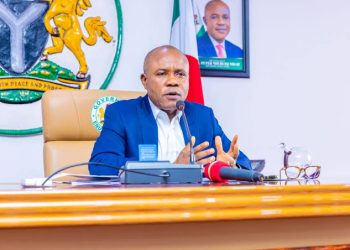By Lekan Sote
By now, President Bola Tinubu should be satisfied that he has made his point after more than four months of declaring a state of emergency in Rivers State with the suspension of Governor Similaye Fubara, his deputy, Ngozi Odu, the Speaker and members of the Rivers State House of Assembly.
It appears that Governor Fubara has gotten the message and has accordingly halted all his tough talk, made peace with his erstwhile principal, Federal Capital Territory Minister, Nyesom Wike, and found a way to accommodate the Rivers State legislators, who were on the verge of impeaching him, before the President “saved” him with the unconstitutional and “illegal” emergency rule.
In recent times, both Fubara and Wike have been seen together, once at Aso Rock Presidential Villa after visiting the President, and with Speaker Martins Amaewhule of Rivers House of Assembly at the burial of Wike’s uncle in Obio-Akpor Local Government Area of Rivers State.
Media reports have also claimed that Fubara visited Wike’s Abuja residence in the company of Governor Dapo Abiodun of Ogun State, Governor Francis Nwifuru of Ebonyi State and former Governor Olusegun Osoba of Ogun State.
Things seem to have improved so much that it was rumoured that Fubara was able to nominate the chairman and councillors for his native Opobo-Nkoro Local Government Area in the local government election that was to hold on August 9, 2025.
But then the wet blanket Rivers State Independent Electoral Commission rescheduled the election to August 30, 2025, for the imprecise reasons that were based on Section 13(5) of RSIEC Law that allows election dates to be shifted if “a serious breach is likely to occur if the election holds… or it is impossible to hold the election as a result of natural disaster or any other emergency”.
Both gladiators should be commended for making these public reconciliatory moves, even if they are doing so because President Tinubu is leaning on them to find a way to accommodate each other. Indeed, Governor Fubara has publicly sued for peace and asked his supporters to hold their fire.
These are positive vibes, if one were to borrow a lingo from the streets of Lagos. It should reassure and reduce the anxiety of the people of Rivers State, who are probably thinking that they have become some kind of political orphans whose sensibilities can be toyed with by Nigeria’s political puppet masters.
Even if the President and the National Assembly do not ask Fubara to resume work now, his suspension and that of members of the Rivers State legislature should definitely end at the expiration of the six months.
Retired Vice Admiral Ibok-Ete Ibas, the former Chief of Air Staff, who replaced him as sole administrator, is probably tired, if not embarrassed, that some citizens of Rivers State regard him as an impostor or a usurper of sorts.
He may have had to keep a brave face, as is expected of military personnel, as he is being confronted by immense pressure from all quarters. On too many occasions, some stakeholders of Rivers State have attempted to embarrass, if not humiliate, him with harsh words they speak in public. And he may therefore be counting the days to his exit from the Rivers State Government House.
In a recent meeting, the People’s Democratic Party Governors Forum called on the President to consider ending the ordeal of Fubara, as well as the actions of his executive branch and members of the Rivers State legislature.
The forum’s Chairman, Governor Bala Mohammed, reiterated their position after what they reasoned was a slow response of the Supreme Court of Nigeria to their challenge of President Tinubu’s unconstitutional declaration of the state of emergency and suspension of Fubara.
In a statement that he read on their behalf, “reasserts our collective determination to avert a rape of our constitution and democracy; hence, the decision to approach the Supreme Court to give a clear verdict on the interpretation of the provision of law on the declaration of a state of emergency in any state of the Federation”.
In any case, Section 305(3) of Nigeria’s Constitution empowers “the President to issue a proclamation of a state of emergency only when: the Federation is at war; the Federation is in imminent danger of invasion or involvement in a state of war; there is actual breakdown of public order and public safety in the Federation or any part thereof to such an extent as to require extraordinary measures to restore peace and security…”
The Constitution is, however, silent on the removal of a governor after the declaration of a state of emergency. Even the diarchy of military officers and civilian politicians, led by Interim President Earnest Shonekan, did not suspend Governor Michael Otedola, who confessed to his inability to contain the violent protests that gripped Lagos State after the annulment of the June 12, 1993 presidential election.
The military merely rolled in the tanks to restore peace. It was the military coup that was staged by Gen. Sani Abacha and his men that eventually ousted Otedola and the other civilian governors, and they were replaced by military administrators.
Sometimes one wonders if the Federal Minister of Justice and Attorney General of the Federation, Lateef Fagbemi, who is reputed to be a brilliant lawyer, ever drew the attention of the President to the limitation of his powers on state of emergency and suspension of state governors.
His futile attempts to defend the state of emergency and suspension of the governor with the argument that no one should be a sacred cow if Nigeria’s petroleum pipelines are threatened in any way are probably the arguments of an arbiter who is also an interested party to an altercation.
He has intelligently anchored his argument for the President’s unconstitutional action on a Supreme Court judgement and what he describes as the failure of Fubara and the Rivers State House of Assembly “to create an enabling environment for the people of Rivers (State) to enjoy the dividend of democracy”.
Mohammed continues: “The forum therefore reiterates its solidarity with His Excellency, Sir Similaye Fubara, on the ordeal in which his state and people are being plunged into by the declaration of the state of emergency. And we reiterate our commitment to stand with him.”
Apart from being the right thing to do, one must submit that the governors’ approach to the Supreme Court for clarification and their call for reinstatement of Fubara must have been informed by the wisdom called enlightened self-interest.
If the fate of Fubara is allowed to go unchallenged in the law courts, it may be the turn of any other governor, especially governors of opposition parties, PDP, that recently lost two of its governors to the ruling All Progressives Congress, and the All Progressives Grand Alliance that has not expanded beyond its primordial base of Anambra State.
A member of the Rivers State Elders Council, Ann-Kio Briggs, who provides counsel and guidance to the Rivers State Government and political stakeholders, is wondering why President Tinubu has not reinstated Fubara since he and Wike have publicly stated that they have buried the hatchet.
The President should try to address Ann-Kio’s curiosity ASAP.
















































